| Srl | Item |
| 1 |
ID:
099004


|
|
|
| 2 |
ID:
099009
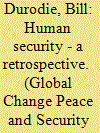

|
|
|
| 3 |
ID:
099001
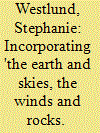

|
|
|
|
|
| Publication |
2010.
|
| Summary/Abstract |
Scholars often re-tell and analyze peacebuilding stories as independent of locale, as though place does not matter. Inspired by a Mayan priest's observation that academic peacebuilding frameworks are missing 'the earth and skies, the winds and rocks', this article examines the role of nature in conflict transformation and peacebuilding. It reviews the results of studies highlighting nature's function in human evolution and in improving mental health and well-being. It then presents three case studies of peacebuilding processes in which participants interacted with one another in natural settings. When these cases are taken at the convergence of the empirical research on nature's emotional and physiological benefits to human beings, a meaningful pattern emerges. Each case becomes understood as tied to the ecologies of the place where participants engaged with one another, thus suggesting that nature is an active yet overlooked participant in conflict transformation and peacebuilding.
|
|
|
|
|
|
|
|
|
|
|
|
|
|
|
|
| 4 |
ID:
099007


|
|
|
| 5 |
ID:
099008
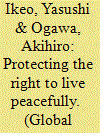

|
|
|
| 6 |
ID:
098999


|
|
|
|
|
| Publication |
2010.
|
| Summary/Abstract |
Previous studies nearly unanimously agree that civil conflicts are more likely to occur in semi-democracies than in either autocracies or democracies. Through multinomial regression analysis, this article re-evaluates this claim by testing the relationship between regime type and civil conflict for the post-Cold War period. Controlling for the material wealth of a country, the heterogeneity of the population, income inequalities and the size of the state, this research finds that the occurrence of minor intrastate wars (25 to 1000 deaths) and major civil wars (more than 1000 deaths) does not differ between hybrid regimes and autocracies. Only democracies have a significantly lower probability of experiencing intrastate fighting and warfare.
|
|
|
|
|
|
|
|
|
|
|
|
|
|
|
|
| 7 |
ID:
099000
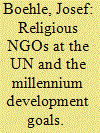

|
|
|
|
|
| Publication |
2010.
|
| Summary/Abstract |
This article reflects on religious non-governmental organisations (RNGOs) at the United Nations and their engagement with the Millennium Development Goals (MDGs) within the UN system. It also situates this engagement within the wider context of contemporary global civil society. It aims to give an introduction to the contemporary situation of religious NGOs at the UN and some of the related and critically debated issues, making use of in-depth interviews with key actors, relevant literature and other documentary materials, as well as selected examples of three major RNGOs engaging with the MDGs. An improved understanding of the work of religious NGOs at the UN and the historical context in which their work takes place can make valuable contributions: it can inform UN agencies and government agencies' policy recommendations and planning decisions, it can enhance self-reflection by civil society organisations, and it can help to identify common ground for all these actors as they seek to develop multi-stakeholder partnerships aiming to meet the MDGs.
|
|
|
|
|
|
|
|
|
|
|
|
|
|
|
|
| 8 |
ID:
099006
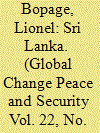

|
|
|
| 9 |
ID:
099003
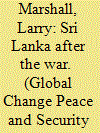

|
|
|
| 10 |
ID:
099005


|
|
|
| 11 |
ID:
099002
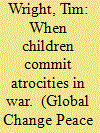

|
|
|
|
|
| Publication |
2010.
|
| Summary/Abstract |
There is considerable disagreement among governments, civil society groups and scholars as to whether the prosecution of child soldiers who have committed war crimes is ever appropriate. In one camp are those who argue that child soldiers should always be considered as victims, and that prosecutions are necessarily at odds with rehabilitation and reintegration efforts. On the other side of the debate are those who maintain that the prosecution of the worst child offenders - those who have occupied command positions in armed forces, and carried out particularly egregious crimes - can help to end impunity for war criminals and bring a degree of solace to the victims of their brutal assaults. This article considers the different approaches to criminal responsibility for minors in domestic legal systems and under international law, and concludes that the prosecution of child soldiers should only be pursued in exceptional circumstances.
|
|
|
|
|
|
|
|
|
|
|
|
|
|
|
|